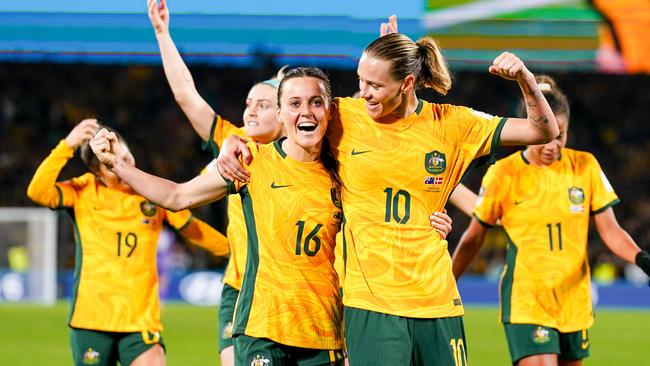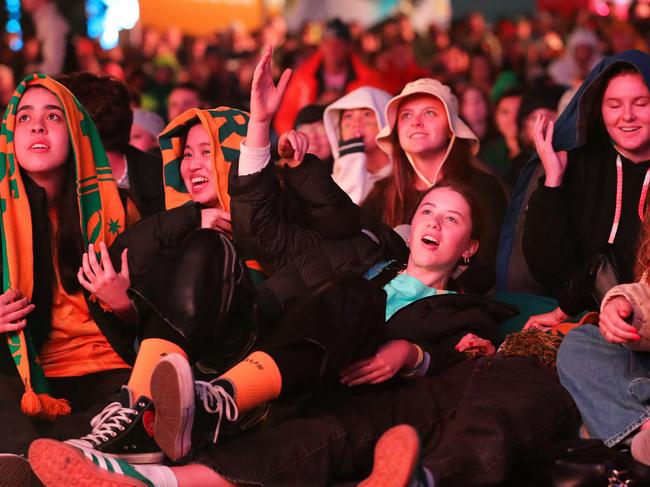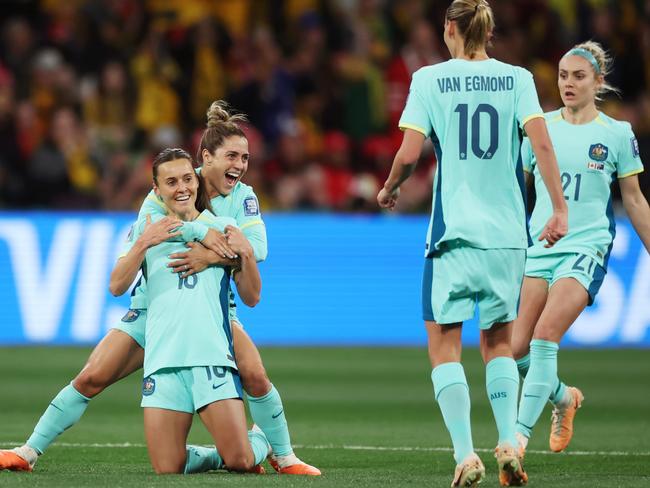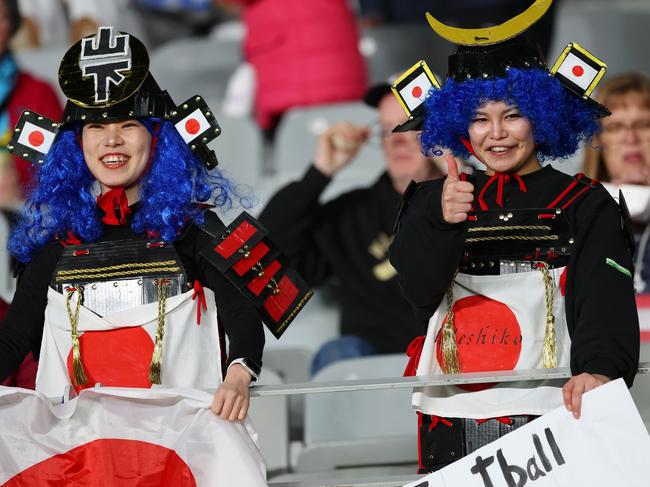How Matildas have defied all expectations and will lead to record-breaking broadcast deal at next World Cup
FIFA will be licking their lips the next time they sell the Women’s World Cup rights thanks to the Matildas, but experts say the hype won’t necessarily translate to a mass increase in participation.
Women's Football
Don't miss out on the headlines from Women's Football. Followed categories will be added to My News.
Television rights for the FIFA Women’s World Cup will skyrocket to unprecedented levels following this year’s event in Australia, but that won’t automatically translate to masses of females taking up the sport, experts say.
Broadcast rights guru Colin Smith said he’d have accused forecasters of “smoking dope” if they’d told him earlier this year Matildas games would outrate AFL and NRL Grand Finals, but he now believes the next deal will be worth “50 per cent more”.
Optus Sport grabbed the rights to all 64 matches of the World Cup for an estimated $20 million, while onselling 15 games to free-to-air network Seven – including all Matildas games and most finals – for a fraction of that.
It means the next World Cup in 2023 would sell for at least $30 million, a percentage increase that only cricket’s Indian Premier League can rival from one event to the next.
That Matildas are truly the team that has transformed Australia’s sporting landscape, with giant screens in every city showing their quarter-final against France, the TV news being pushed back, and merchandise selling out across the country.

Smith, who runs Global Media & Sports – a company that has advised FIFA, Formula One, the PGA Tour and Australia’s football codes in negotiations – says this tournament is a game-changing success after it had struggled to gain interest in some markets.
“FIFA would be rubbing their hands with glee next time they’re selling the rights, they won’t have the same challenges of threatening broadcasters in Europe et cetera, that won’t happen,” Smith said.
“And how brilliant a strategy has Channel 7 devised, got 15 games, didn’t pay a lot for it at all, but it’s been a masterclass.
“I’m not a football aficionado, but I am a broadcasting aficionado and I think the coverage from Seven and Optus has been great.
“James Warburton (Seven’s chief executive) would be loving this. Who would have expected when they acquired those 15 games that there would be a game, in a round of 16, not even a quarter-final, that would be bigger than State of Origin, bigger than the NRL grand final, bigger than the AFL grand final? No one.
“If somebody had said that to me in January this year, I’d have said, ‘You’re smoking dope’.
“It just shows you, Australians embrace being top of the pops, and they’ve embraced the Matildas.
“I could see, around the world, the value in the big markets, North America, Europe and Asia, that could increase by 50 per cent.
“Because that is now must-watch content. FIFA has done a good job with this.
“People will be paying greater premiums for the female World Cup, including Australia unless the Matildas don’t qualify.

“The only sporting event that comes to mind (with a similar rise in value from tournament to the next) is the Indian Premier League cricket, that’s a similar trajectory into one nation, but there’s massive growth with the massive subcontinent expat community – I think there’s 25 million of that expat community in the United States alone.
“So they’re going to have their own professional league (in the US) from next year and the CEO of Microsoft (Satya Nadella) is going to own one of the teams, he was educated in India and loves cricket, but it just shows you the expat communities are going to drive this, and the same goes with football.”
Football Australia has a legacy plan beyond this tournament that aims to attract 400,000 new females to take up football over the next four years.
Dr Alana Thomson from La Trobe University is advising Football Victoria on how to grow their female player base beyond this World Cup, but warned that FA’s target is hopeful.
“That number of 400,000, that’s a lot, it is ambitious but not impossible if stakeholders combine their efforts,” Dr Thomson said.
“If you break that down, every club in Australia has got to pick up a few female participants. And we don’t just want them to come to a ‘Come and try day’, we want them to sign up for next season.
“We look at this World Cup and think, ‘Yeah, this is definitely going to impact the next generation of players’, but there’s such a huge difference between people being inspired by an event, compared to them being motivated and supported enough to sign with a club and become a participant.
“This event is happening at the end of the traditional winter football season, so you’re going to have an influx of women and girls who are going to be excited to join at a time the club is winding down for the season.
“So we’re asking, ‘Is there something the club could run over the summer?’ Modified social games, just getting people involved.
“People move on, we’ve got an Olympics next year, people start talking about other things a few weeks after the event finishes, so you have a small window to take advantage.”

Covid led to the rapid decline of volunteers returning to help their local clubs, creating a mass shortage of people to run these sorts of programs.
“From a legacy perspective, the research from 20 years of looking at the trickle down effects of events show us that the most conclusive outcome is that people will watch sport, but it doesn’t mean they’ll participate more,” Dr Thomson said.
“We have heard in Australia, ever since the 2000 Olympics, this idea that hosting events will lead to greater participation. There’s not conclusive research that happens.
“If anything, it doesn’t happen automatically. The times that it has happened, there’s been really specific, well-resourced targeted strategies around an event to engage the community.
“What we need to understand in the women’s sports space is that women don’t participate as much as men do, one of the reasons being there a whole host of barriers that prevent their participation.
“Women typically in our modern society still have barriers, so hosting an event like this, while it has been exciting, engaging and broken a number of records, it doesn’t take away the barriers that exist at the grassroots level.
“Some of the work we’re doing this World Cup is sport development at grassroots level, working with the governing bodies, the local communities, clubs, to make sure they have the capacity so if women and girls see the event and are inspired to participate they can.

“There are a number of clubs around Australia that are still not providing opportunities for females, or if they are it’s mixed in with the boys, which is OK for some women, but not everyone feels safe and comfortable in that environment.”
But given that the Matildas have set new broadcast records during this tournament, and fans have flocked to watch live, millions of new dollars will be on offer for players and administrators in coming years.
“The attendances and TV are interrelated, you want full stadiums to attract people to watch it, if you’ve got empty stadia that doesn’t work,” Smith said.
“Clearly, this is now a premium global property. There’s no doubt about that.
“It’s accelerated, so FIFA, the next time around, will not have the same challenges of selling it.
“Broadcasters tend to be conservative, or believe in the status quo, and not necessarily pay premiums for a product that is yet to be proven.
“What this World Cup has demonstrated is that a number of records have been broken, the Australian numbers are absolutely incredible, therefore there’s going to be a significant, northwards appraisal of the value of the women’s football World Cup.
“Let’s cut to the chase, it’s going to be nowhere near the men’s World Cup, that will evolve over time, but what this demonstrates is that is has really been embraced by fans globally.
“When they went to 32 teams I thought it would degrade the product, in fact it didn’t, some of the star teams quickly exited which you didn’t expect and added some more theatre to the quality of the competition.”
More Coverage
Originally published as How Matildas have defied all expectations and will lead to record-breaking broadcast deal at next World Cup





